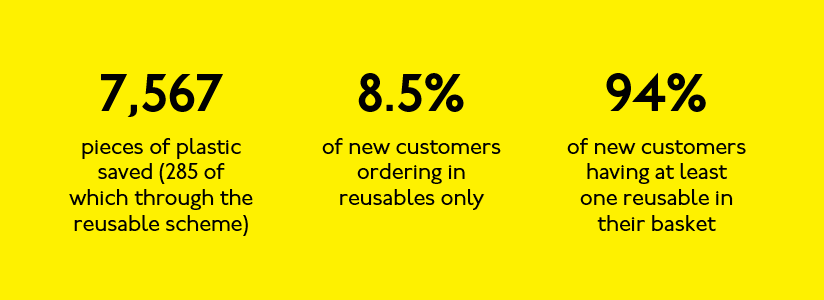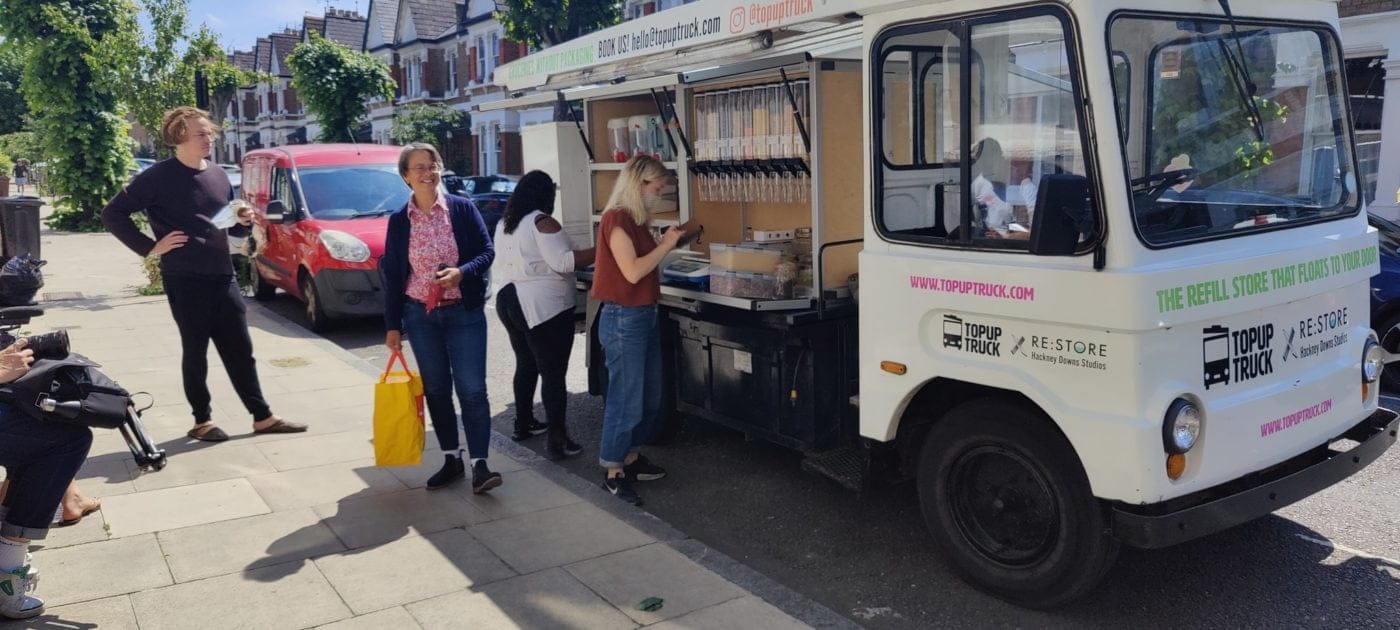Snapshot
TOPUP TRUCK, a door-to-door service offering refill groceries from an electric milk float, was looking to meet their customers’ changing needs after coming out of lockdown.
ReLondon awarded the business a grant from the Mayor of London’s Green New Deal fund and advisory support from the ERDF-funded business transformation programme to pilot a new, closed-loop reusable packaging scheme to replace their ‘bring-your-own’ model.
What was the challenge?
TOPUP TRUCK is a new business that was born out of the pandemic: when London was in lockdown and people were at home, TOPUP TRUCK offered an opportunity to buy groceries without single-use packaging. Their electric milk float, stocked with bulk-volumes of groceries, visited different neighbourhoods and customers could refill their own containers. TOPUP TRUCK noticed how this gathering of neighbours built a sense of community among shoppers who were otherwise isolating in their homes, all while saving thousands of pieces of plastic from being used and disposed of.
When COVID-19 restrictions were lifted, and people were at home less TOPUP TRUCK decided to adjust their offering. They were particularly keen to make it more accessible and attractive to busy Londoners who didn’t have time to refill their containers at the milk float, and introduce the concept of zero-waste grocery shopping to the unconverted.
What did we do?
TOPUP TRUCK had an idea for a new service: alongside the ‘bring-your-own container’ model, they would introduce a closed-loop reusable packaging system. This would give customers the choice of pre-ordering groceries in reusable containers, and returning and refilling them on TOPUP TRUCK’s next round.
Thanks to a grant from the Mayor of London’s Green New Deal fund and supported throughout by a dedicated business advisor from ReLondon’s ERDF-funded business transformation programme they were able to pilot the new model.
Through the pilot, TOPUP TRUCK would test whether this new model would make it more likely for people in North and East London to switch from conventional supermarkets to zero-waste grocery shopping – reducing the number of pieces of single-use plastic used. TOPUP TRUCK were also hoping to increase their revenue and efficiency of their operations, through the prefilling of containers, and decide whether to pivot their entire business to this new model. To make the new offering a reality, TOPUP TRUCK not only had to buy the required equipment, such as different types of containers and cleaning infrastructure, they also had to rebuild their website to facilitate pre-payment of these quick drop orders. With all the operations in place, they were ready to advertise this new service to existing and potential customers, and discover who would take it up.
What were the outcomes?
TOPUP TRUCK started their trial in December 2021. By the end of March 2022, they had saved 7,567 pieces of plastic by selling zero-waste groceries to their customers. However, much to TOPUP TRUCK’s surprise, only 285 of these pieces (~4%) were due to customers taking up the offer of reusable packaging. In other words, ~96% of TOPUP TRUCK’s products continued to be sold in customers’ own containers!
The pilot helped TOPUP TRUCK understand that customers were most interested in purchasing ‘mixed baskets’ of goods – meaning, a combination of products in both ‘bring-your-own’ and reusable containers, rather than ordering products only in reusables. This was especially true for new customers: while 94% had at least one reusable in their basket (with oat milk being particularly popular), only 8.5% ordered in reusables only.

Lessons learned and next steps
TOPUP TRUCK’s pilot is a great example of how avoiding single-use plastic waste in grocery shopping can be achieved through different solutions: different customers want different experiences when it comes to buying groceries without single-use packaging.
Ella Shone, TOPUP TRUCK founderApparently, there is a ‘joy’ factor to bringing your own containers to shop at our milk float, which we had underestimated before the pilot.
The pilot has helped TOPUP TRUCK realise that their existing offer – dispensing groceries into people’s containers directly at the TOPUP TRUCK – is more popular among their existing customers and is a great engine to create new customers, compared to a reusables-only scheme. This was an unexpected but valuable learning. TOPUP TRUCK had assumed that they would need to change to a more ‘convenient’ model (without the effort of bringing your own containers) to attract customers now spending less time at home. However, they were pleasantly surprised to receive customer feedback during the pilot that showed they actually liked using jars or other options they already have at home – and that the cost of the deposit paid for the reusables could be offputting.
Furthermore, TOPUP TRUCK learned that trialling a service that affects the whole business can be a lot more time-consuming than anticipated, particularly when all aspects of the business are interconnected. For example, not only was the launch of their website crucial to manage the new offering, but for customers to accept it, the customer journey on the website had to be easy to understand.
The pilot has really helped TOPUP TRUCK to define their business strategy post-pandemic and they continue to trial their reusable scheme to make it work better for their customers. They are seeing positive results and are now seeking investment to build upon their model.
If you are an impact investor who shares their mission or are interested in working with TOPUP TRUCK, you can get in touch with ella@topuptruck.com
You can hear more about TOPUP TRUCK direct from its creator Ella Shone in Episode 14 of the Circular Economy Playbook podcast here.
ReLondon’s business transformation team continues to help small-and-medium sized businesses in London adopt the circular economy through our advisory support, grant schemes, and matchmaking services. Find out more about our fully funded business support programme at our website: www.relondon.gov.uk/business



